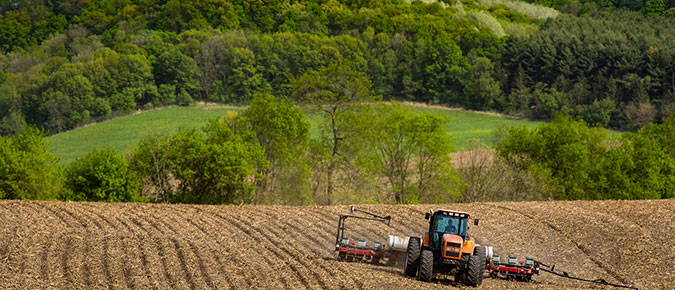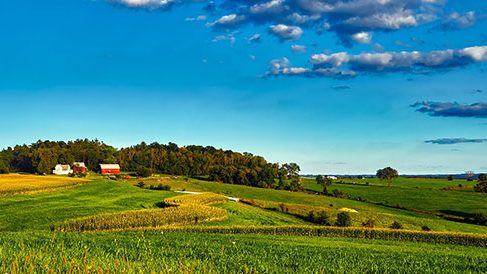Home » Topics » Ag Pricing and Contracts » Ag Land Lease and Rental Agreements » Contracts and Law
Contracts and Law
Contracts and Law
Home » Ag Land Pricing & Contracts » Land Lease and Rental Agreements » Contracts and Law
Rental agreements, whether verbal or written, are contracts that are subject to Wisconsin law. Farmers and landlords who take time to manage these agreements reduce risk by ensuring continuity in land access, clear expectations for both parties, and enforceability of the agreed upon terms in the event of a disagreement.
Jump to…
What is a lease?
A lease is an agreement where the owner of a property transfers the right to use that property to another person or business for a designated period of time in exchange for payment. A lease only provides the right for the tenant to occupy and use the property, unlike a sale which transfers ownership of the property. A lease may be oral or written, although Wisconsin law does require certain conditions for a farm lease to be enforceable.
What types of leases are used with farmland?
Farm lease structures vary across the United States. A cash rent lease is a fixed agreement in which a landowner receives a pre-determined payment from the farmer to rent the farmland —it does not change based on crop, yield, or market prices. Meanwhile, a crop-share lease refers to a method of leasing cropland where profit may be shared between the landowner and the operator based on an agreed-upon calculation. A third option, the flexible cash lease, balances the two approaches by providing for a lower agreed-upon base payment plus a portion of the profits. Arrangements may also vary when discussing pasture rentals or building rentals rather than cropland. While the cash rent lease is most common in Wisconsin, it is ultimately up to the landlord and tenant to decide what arrangement works best for them.
What terms should I include in my farm lease?
Aside from the terms that are required for a farm lease to be enforceable in Wisconsin, a landlord and tenant are free to choose the type of lease that works best for them. There are many terms to consider when negotiating a farm lease. It may take some time to create a robust agriculture land lease as you discuss items such as land use, conservation, water use, hunting rights, enrollment in federal farm programs, property taxes, and more.
Should my lease be in writing?
An oral lease for longer than one year is not enforceable in Wisconsin, so it is advisable to document your lease with a signed contract. A written lease also provides a clear record of the expectations the landlord and tenant have for the relationship. This can help prevent misunderstandings and provide legal protection in case of a disagreement.
How do I negotiate a farm lease?
A farm lease may include more expectations of the landlord or tenant than simply paying rent. There are many terms to consider when negotiating a farm lease. Negotiating a farm lease may seem intimidating, but it is really about improving communication with your landlord or tenant.
Keep in mind that every lease may be different, since every landlord’s and every farmer’s relationship and needs may be different. For example, there may be special considerations for navigating lease agreements for small acreage, high value crops.
How do I terminate a farmland lease?
If you have a written farm lease, then the lease terminates when the agreed upon term expires unless there is a renewal provision that says otherwise. You should carefully review any written agreement before signing, as a written lease may also provide other conditions under which a farm lease may be terminated sooner than expiration.
If you have a verbal farm lease agreement, then, in most cases, the landowner or tenant must give 90-days notice before the end of the annual rental period that they intend to terminate the lease at that time.
For more specific details, review terminating a farmland lease or tenancy.
What happens to my lease if my landlord sells the land?
If your agreement doesn’t specify otherwise, then Wisconsin law allows the landlord to sell the land, subject to the lease, without the tenant needing to consent. The new owner generally takes over the lease under the same terms and conditions, again, unless the lease agreement specifies otherwise. It’s a good idea to include a clause in the lease addressing this scenario.
A landlord who is selling farm property that is under lease must disclose the lease to a buyer. A buyer who is unaware of the lease at the time of purchase may have a right to pursue a claim against the seller if the seller did not disclose the lease. However, the transfer does not terminate the farm lease. If the new buyer wishes to terminate the lease, they must follow the law or the agreement to do so.
Where can I find a farm lease template?
A farm lease template provides an efficient starting point for drafting a farm lease agreement. However, farm lease templates are often general and may not fully capture the nuances of each landlord-farmer relationship. When using a lease template, your agreement should still be reviewed by a legal professional to ensure compliance with state law and to address any circumstances that may be unique to the landlord-farmer relationship before being signed by the parties.
Explore farm lease templates and examples.
What should farmers consider when reviewing a solar lease or solar easement?
Explore solar contract considerations.












